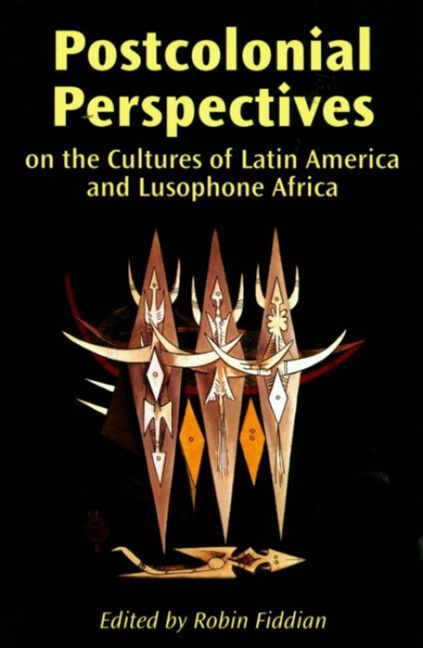Book contents
- Frontmatter
- Contents
- Preface
- Locating the Object, Mapping the Field: the Place of the Cultures of Latin America and Lusophone Africa in Postcolonial Studies
- Chapter One On Metropolitan Readings of Latin American Cultures: Ethical Questions of Postcolonial Critical Practice
- Chapter Two Ig/noble Barbarians: Revisiting Latin American Modernisms
- Chapter Three José Carlos Mariátegui: Culture and the Nation
- Chapter Four Doing Time in Peru: the Poetics of Multitemporality as Method for Cultural History
- Chapter Five America, Americanism and the Third World in the Work of Leopoldo Zea
- Chapter Six Fernando Ortiz's Transculturation: the Postcolonial Intellectual and the Politics of Cultural Representation
- Chapter Seven Caribbean Masks: Frantz Fanon and Alejo Carpentier
- Chapter Eight Colonial Crosswords: (In)voicing the Gap in Mia Couto
- Index
Chapter Eight - Colonial Crosswords: (In)voicing the Gap in Mia Couto
- Frontmatter
- Contents
- Preface
- Locating the Object, Mapping the Field: the Place of the Cultures of Latin America and Lusophone Africa in Postcolonial Studies
- Chapter One On Metropolitan Readings of Latin American Cultures: Ethical Questions of Postcolonial Critical Practice
- Chapter Two Ig/noble Barbarians: Revisiting Latin American Modernisms
- Chapter Three José Carlos Mariátegui: Culture and the Nation
- Chapter Four Doing Time in Peru: the Poetics of Multitemporality as Method for Cultural History
- Chapter Five America, Americanism and the Third World in the Work of Leopoldo Zea
- Chapter Six Fernando Ortiz's Transculturation: the Postcolonial Intellectual and the Politics of Cultural Representation
- Chapter Seven Caribbean Masks: Frantz Fanon and Alejo Carpentier
- Chapter Eight Colonial Crosswords: (In)voicing the Gap in Mia Couto
- Index
Summary
Mia Couto, author of chronicles, novels, short stories and some poetry, has emerged as perhaps the best known writer of postindependence Mozambique. His works, published in large editions in both Mozambique and Portugal, have also been translated into several languages, including English. As was also the case with almost all pre-independence Mozambican literature, important aspects of his work have to be contextualized through an awareness of the political background, in his case the events that beset Mozambique in the decades following its political separation from Portugal, attained after ten years of a conflict which, immediately after independence was gained, was followed by a civil war that lasted almost twenty years, finally ending in 1994.
The civil war between the post-independence Marxist-Leninist FRELIMO government and the resistance movement, RENAMO, supported initially by Rhodesia (as it then was) and subsequently by South Africa, created in the ideological but also psychic life of the country, and of its intellectuals, a conflict not previously posed by the much simpler, straightforward, inimical categories of black and white, Portuguese and Mozambican of the pre-independence war years. In the context of a conflict which, albeit not on the whole tribal, led to the killing of blacks by blacks, the pre-independence utopia of homogeneous black pan-Africanism and brotherhood gave way instead to the awareness of what for want of a better term might be seen as a potential for balkanization in the region, a Rwanda-type scenario, emerging in antithesis to the dream of black unity nationwide. The awareness of this forcible discarding of the hope of straightforward national categories and of a unified identity in a post-independence Mozambique purged of heterogeneous (namely European) variations becomes, I think, relevant to the discussion that follows of certain themes in Mia Couto's narratives. It is so, certainly, in the short story I shall be concentrating on, dealing as it does with the dream of linear and monodimensional racial and/or national identity, in the face of disturbing heterogeneity. In this connection, too, it is worth mentioning that in Mia Couto, as made explicit by him in a variety of newspaper interviews given during and in the aftermath of the civil war, the poignancy of the reality of this war and its associated ills is not, however, treated as an absolute negative.
- Type
- Chapter
- Information
- Publisher: Liverpool University PressPrint publication year: 2000



